Business Law Assignment: Agency, Estoppel, Silence and Deception
VerifiedAdded on 2022/11/23
|6
|1208
|371
Homework Assignment
AI Summary
This business law assignment solution addresses two key questions. The first question explores the legal force of contracts created by agents with apparent authority, defining estoppel and ostensible authority, and citing the case of Hely Hutchinson v Brayhead Ltd (1968) 1 QB 549. The second question examines the extent to which silence can be considered misleading or deceptive conduct under section 18 of the Australian Consumer Law (ACL), referencing the ACCC v LG Electronics Australia Pty Ltd [2017] FCA 1047 case. The solution provides a detailed analysis of agency law, contract law, and consumer protection, along with relevant case law and legal principles, demonstrating how silence can be interpreted as misleading or deceptive in commercial contexts, potentially leading to liability under Australian law. The assignment also includes a discussion on the role of the Australian Securities and Investment Commission Act 2001 (Cth) in preventing misleading and deceptive activities in trade and commerce.
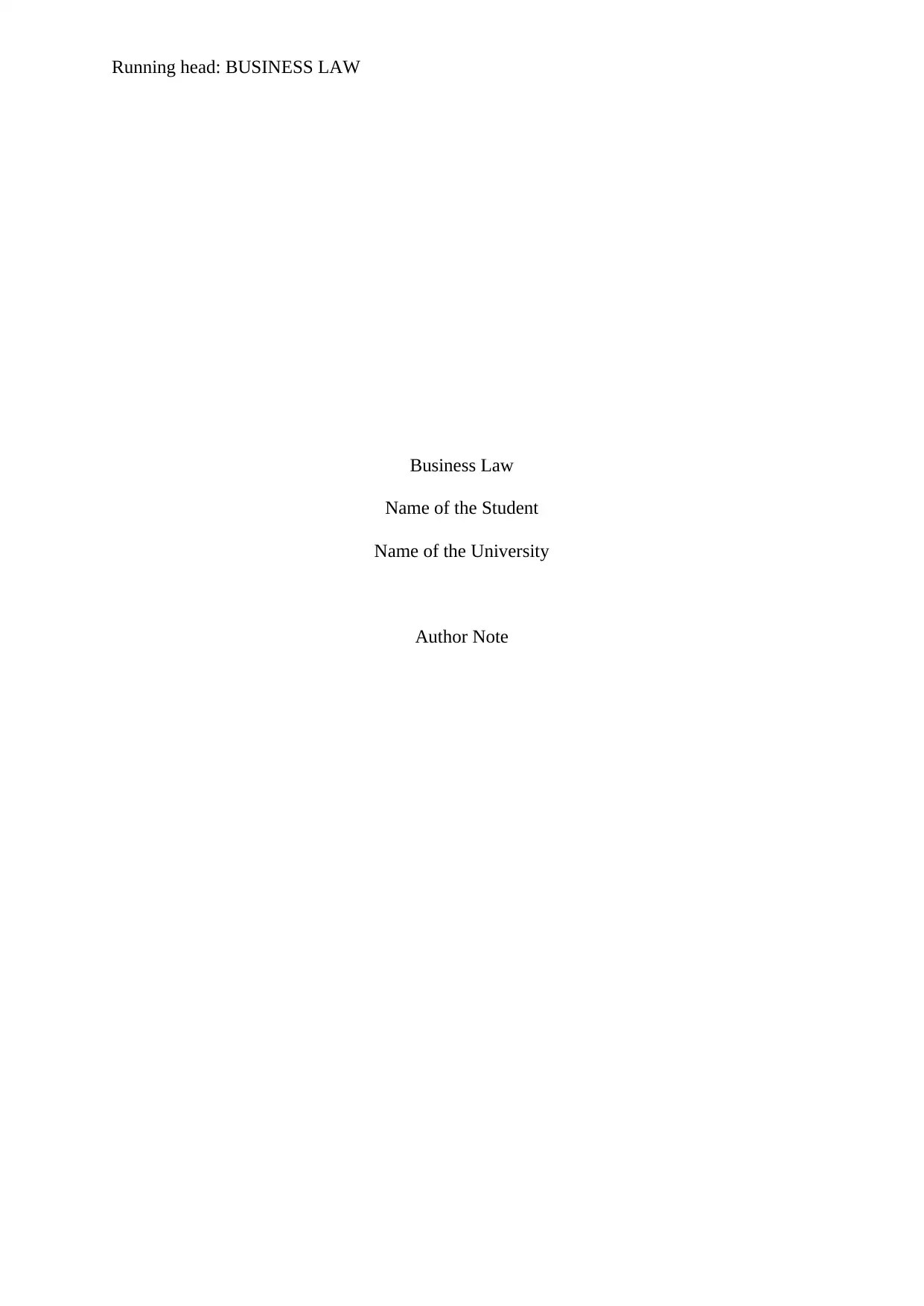
Running head: BUSINESS LAW
Business Law
Name of the Student
Name of the University
Author Note
Business Law
Name of the Student
Name of the University
Author Note
Paraphrase This Document
Need a fresh take? Get an instant paraphrase of this document with our AI Paraphraser
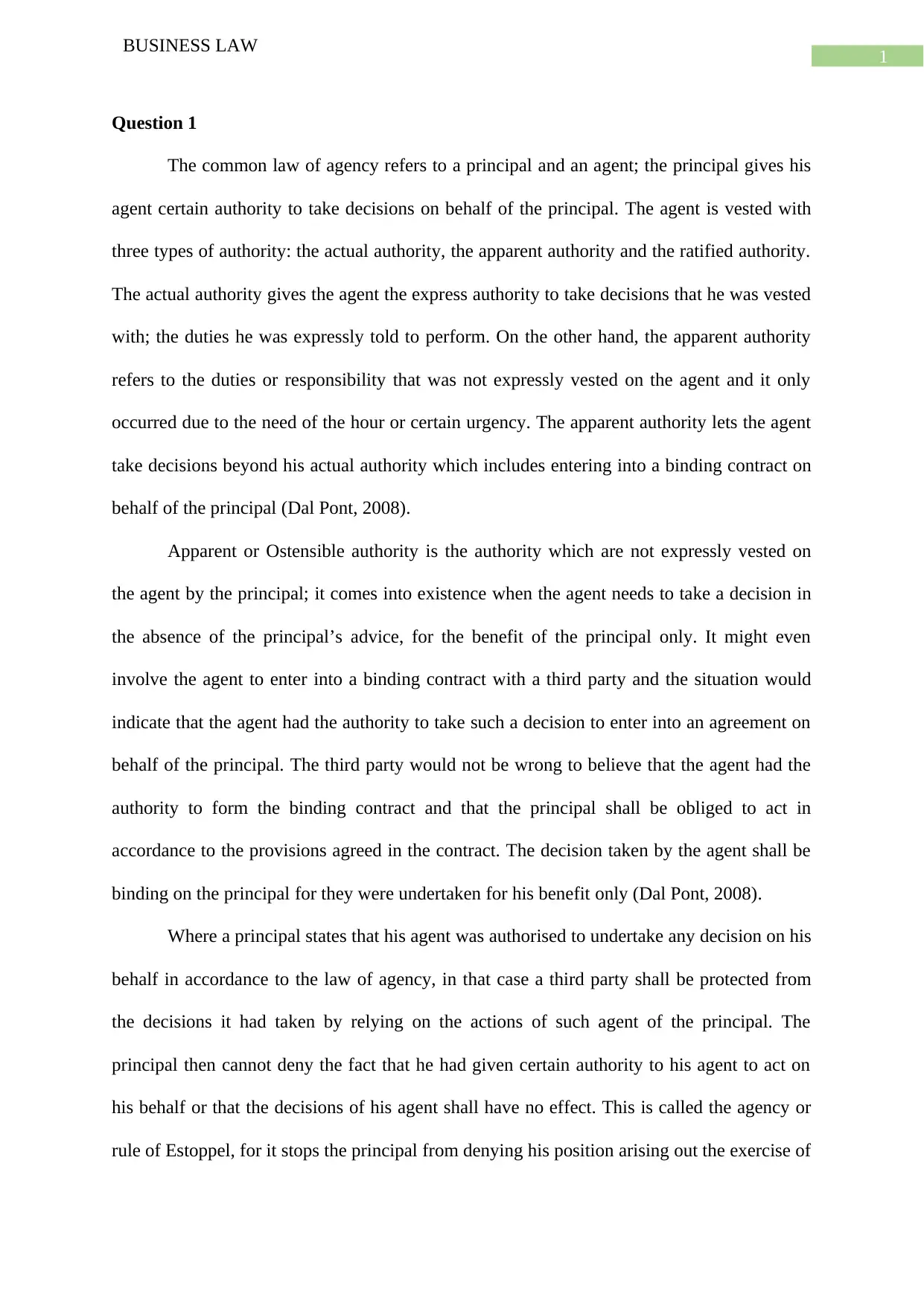
1
BUSINESS LAW
Question 1
The common law of agency refers to a principal and an agent; the principal gives his
agent certain authority to take decisions on behalf of the principal. The agent is vested with
three types of authority: the actual authority, the apparent authority and the ratified authority.
The actual authority gives the agent the express authority to take decisions that he was vested
with; the duties he was expressly told to perform. On the other hand, the apparent authority
refers to the duties or responsibility that was not expressly vested on the agent and it only
occurred due to the need of the hour or certain urgency. The apparent authority lets the agent
take decisions beyond his actual authority which includes entering into a binding contract on
behalf of the principal (Dal Pont, 2008).
Apparent or Ostensible authority is the authority which are not expressly vested on
the agent by the principal; it comes into existence when the agent needs to take a decision in
the absence of the principal’s advice, for the benefit of the principal only. It might even
involve the agent to enter into a binding contract with a third party and the situation would
indicate that the agent had the authority to take such a decision to enter into an agreement on
behalf of the principal. The third party would not be wrong to believe that the agent had the
authority to form the binding contract and that the principal shall be obliged to act in
accordance to the provisions agreed in the contract. The decision taken by the agent shall be
binding on the principal for they were undertaken for his benefit only (Dal Pont, 2008).
Where a principal states that his agent was authorised to undertake any decision on his
behalf in accordance to the law of agency, in that case a third party shall be protected from
the decisions it had taken by relying on the actions of such agent of the principal. The
principal then cannot deny the fact that he had given certain authority to his agent to act on
his behalf or that the decisions of his agent shall have no effect. This is called the agency or
rule of Estoppel, for it stops the principal from denying his position arising out the exercise of
BUSINESS LAW
Question 1
The common law of agency refers to a principal and an agent; the principal gives his
agent certain authority to take decisions on behalf of the principal. The agent is vested with
three types of authority: the actual authority, the apparent authority and the ratified authority.
The actual authority gives the agent the express authority to take decisions that he was vested
with; the duties he was expressly told to perform. On the other hand, the apparent authority
refers to the duties or responsibility that was not expressly vested on the agent and it only
occurred due to the need of the hour or certain urgency. The apparent authority lets the agent
take decisions beyond his actual authority which includes entering into a binding contract on
behalf of the principal (Dal Pont, 2008).
Apparent or Ostensible authority is the authority which are not expressly vested on
the agent by the principal; it comes into existence when the agent needs to take a decision in
the absence of the principal’s advice, for the benefit of the principal only. It might even
involve the agent to enter into a binding contract with a third party and the situation would
indicate that the agent had the authority to take such a decision to enter into an agreement on
behalf of the principal. The third party would not be wrong to believe that the agent had the
authority to form the binding contract and that the principal shall be obliged to act in
accordance to the provisions agreed in the contract. The decision taken by the agent shall be
binding on the principal for they were undertaken for his benefit only (Dal Pont, 2008).
Where a principal states that his agent was authorised to undertake any decision on his
behalf in accordance to the law of agency, in that case a third party shall be protected from
the decisions it had taken by relying on the actions of such agent of the principal. The
principal then cannot deny the fact that he had given certain authority to his agent to act on
his behalf or that the decisions of his agent shall have no effect. This is called the agency or
rule of Estoppel, for it stops the principal from denying his position arising out the exercise of
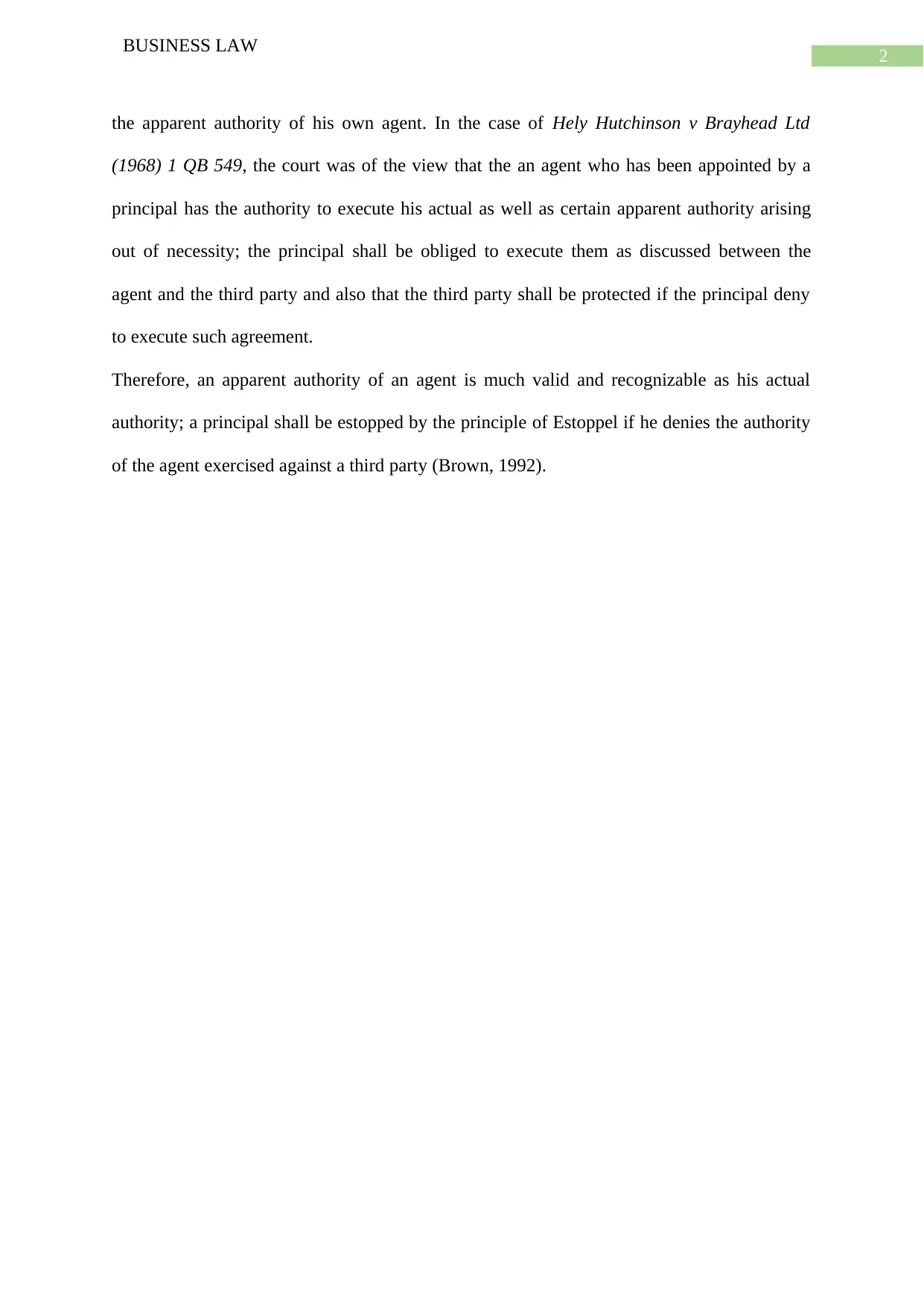
2
BUSINESS LAW
the apparent authority of his own agent. In the case of Hely Hutchinson v Brayhead Ltd
(1968) 1 QB 549, the court was of the view that the an agent who has been appointed by a
principal has the authority to execute his actual as well as certain apparent authority arising
out of necessity; the principal shall be obliged to execute them as discussed between the
agent and the third party and also that the third party shall be protected if the principal deny
to execute such agreement.
Therefore, an apparent authority of an agent is much valid and recognizable as his actual
authority; a principal shall be estopped by the principle of Estoppel if he denies the authority
of the agent exercised against a third party (Brown, 1992).
BUSINESS LAW
the apparent authority of his own agent. In the case of Hely Hutchinson v Brayhead Ltd
(1968) 1 QB 549, the court was of the view that the an agent who has been appointed by a
principal has the authority to execute his actual as well as certain apparent authority arising
out of necessity; the principal shall be obliged to execute them as discussed between the
agent and the third party and also that the third party shall be protected if the principal deny
to execute such agreement.
Therefore, an apparent authority of an agent is much valid and recognizable as his actual
authority; a principal shall be estopped by the principle of Estoppel if he denies the authority
of the agent exercised against a third party (Brown, 1992).
⊘ This is a preview!⊘
Do you want full access?
Subscribe today to unlock all pages.

Trusted by 1+ million students worldwide
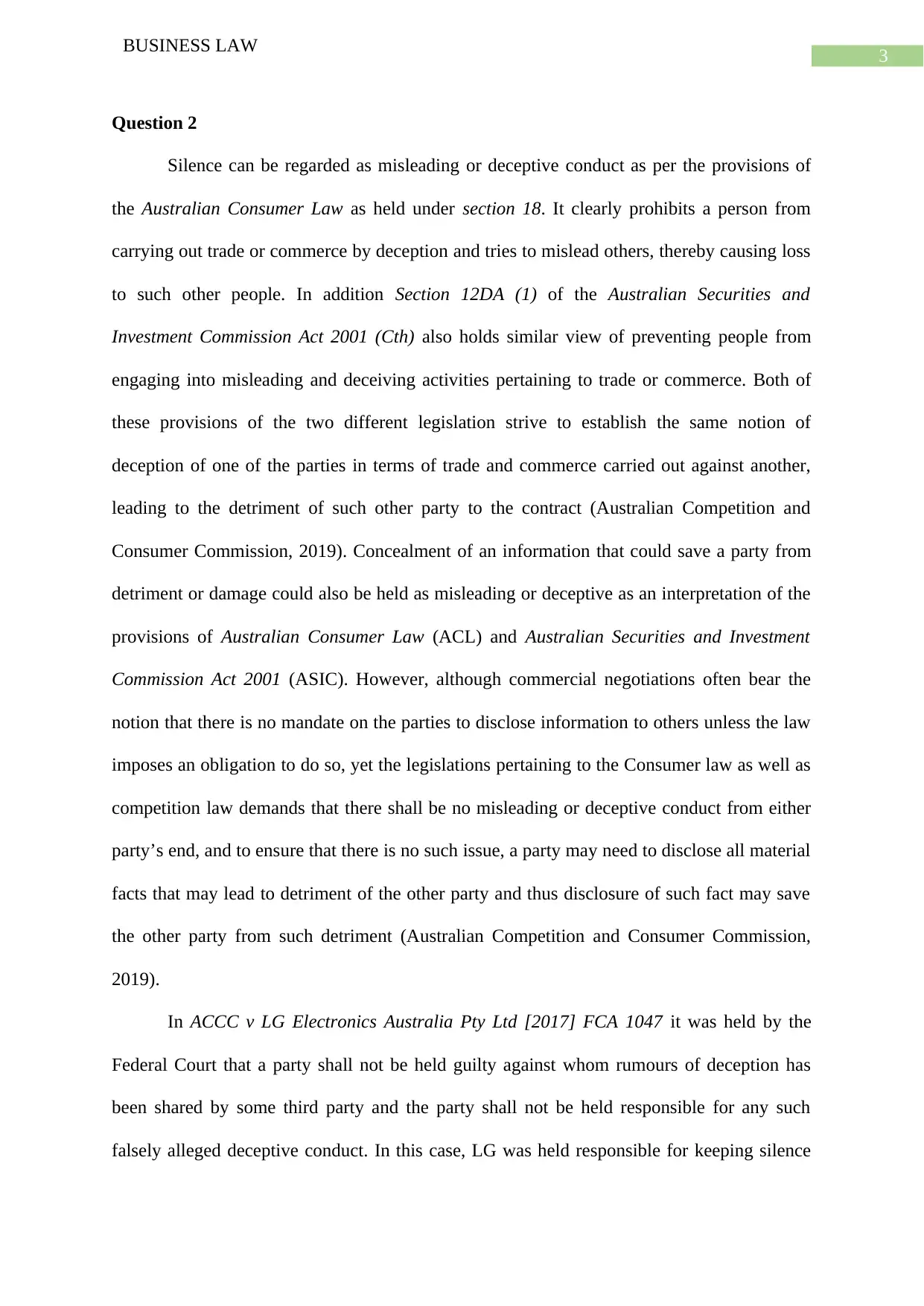
3
BUSINESS LAW
Question 2
Silence can be regarded as misleading or deceptive conduct as per the provisions of
the Australian Consumer Law as held under section 18. It clearly prohibits a person from
carrying out trade or commerce by deception and tries to mislead others, thereby causing loss
to such other people. In addition Section 12DA (1) of the Australian Securities and
Investment Commission Act 2001 (Cth) also holds similar view of preventing people from
engaging into misleading and deceiving activities pertaining to trade or commerce. Both of
these provisions of the two different legislation strive to establish the same notion of
deception of one of the parties in terms of trade and commerce carried out against another,
leading to the detriment of such other party to the contract (Australian Competition and
Consumer Commission, 2019). Concealment of an information that could save a party from
detriment or damage could also be held as misleading or deceptive as an interpretation of the
provisions of Australian Consumer Law (ACL) and Australian Securities and Investment
Commission Act 2001 (ASIC). However, although commercial negotiations often bear the
notion that there is no mandate on the parties to disclose information to others unless the law
imposes an obligation to do so, yet the legislations pertaining to the Consumer law as well as
competition law demands that there shall be no misleading or deceptive conduct from either
party’s end, and to ensure that there is no such issue, a party may need to disclose all material
facts that may lead to detriment of the other party and thus disclosure of such fact may save
the other party from such detriment (Australian Competition and Consumer Commission,
2019).
In ACCC v LG Electronics Australia Pty Ltd [2017] FCA 1047 it was held by the
Federal Court that a party shall not be held guilty against whom rumours of deception has
been shared by some third party and the party shall not be held responsible for any such
falsely alleged deceptive conduct. In this case, LG was held responsible for keeping silence
BUSINESS LAW
Question 2
Silence can be regarded as misleading or deceptive conduct as per the provisions of
the Australian Consumer Law as held under section 18. It clearly prohibits a person from
carrying out trade or commerce by deception and tries to mislead others, thereby causing loss
to such other people. In addition Section 12DA (1) of the Australian Securities and
Investment Commission Act 2001 (Cth) also holds similar view of preventing people from
engaging into misleading and deceiving activities pertaining to trade or commerce. Both of
these provisions of the two different legislation strive to establish the same notion of
deception of one of the parties in terms of trade and commerce carried out against another,
leading to the detriment of such other party to the contract (Australian Competition and
Consumer Commission, 2019). Concealment of an information that could save a party from
detriment or damage could also be held as misleading or deceptive as an interpretation of the
provisions of Australian Consumer Law (ACL) and Australian Securities and Investment
Commission Act 2001 (ASIC). However, although commercial negotiations often bear the
notion that there is no mandate on the parties to disclose information to others unless the law
imposes an obligation to do so, yet the legislations pertaining to the Consumer law as well as
competition law demands that there shall be no misleading or deceptive conduct from either
party’s end, and to ensure that there is no such issue, a party may need to disclose all material
facts that may lead to detriment of the other party and thus disclosure of such fact may save
the other party from such detriment (Australian Competition and Consumer Commission,
2019).
In ACCC v LG Electronics Australia Pty Ltd [2017] FCA 1047 it was held by the
Federal Court that a party shall not be held guilty against whom rumours of deception has
been shared by some third party and the party shall not be held responsible for any such
falsely alleged deceptive conduct. In this case, LG was held responsible for keeping silence
Paraphrase This Document
Need a fresh take? Get an instant paraphrase of this document with our AI Paraphraser
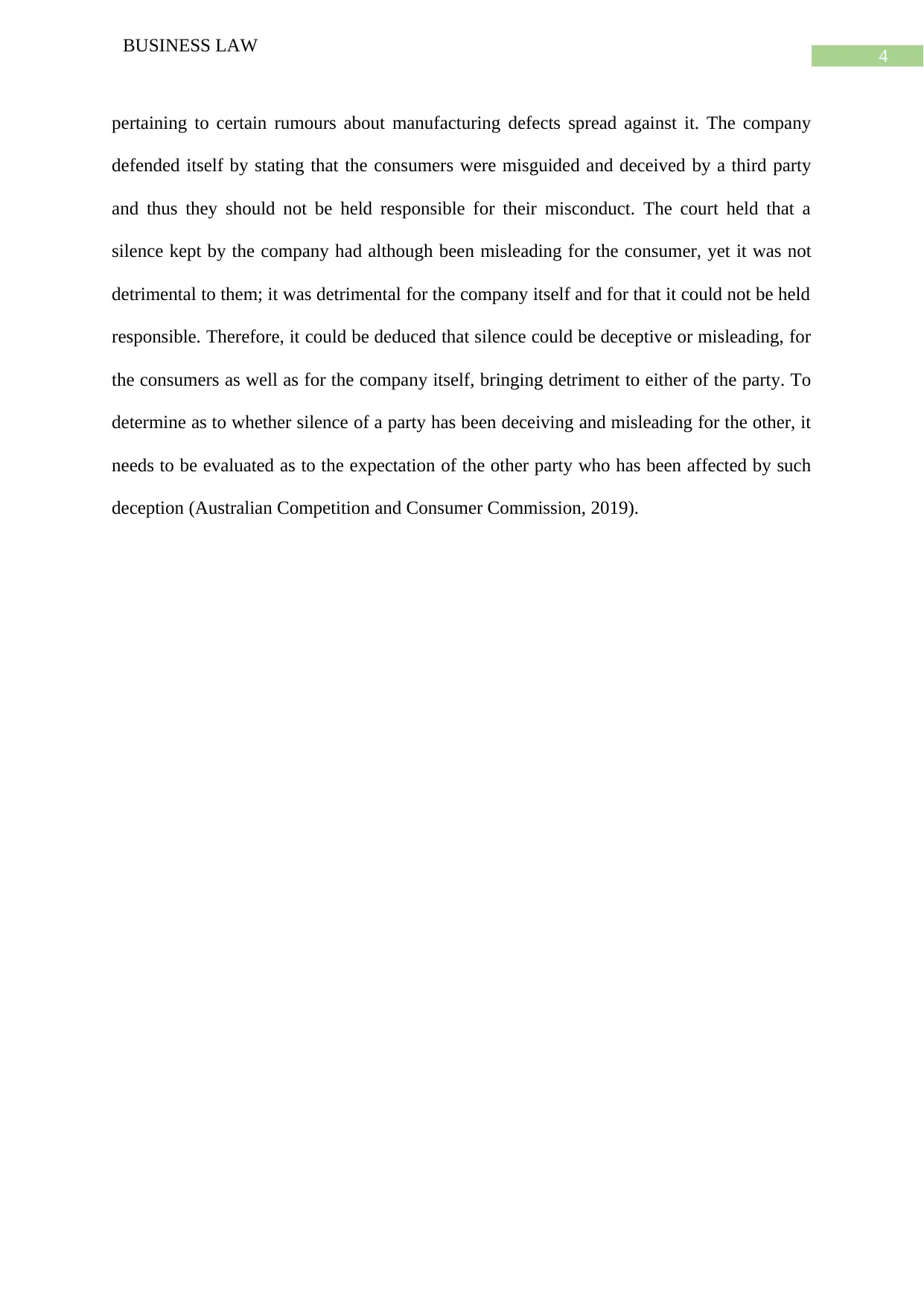
4
BUSINESS LAW
pertaining to certain rumours about manufacturing defects spread against it. The company
defended itself by stating that the consumers were misguided and deceived by a third party
and thus they should not be held responsible for their misconduct. The court held that a
silence kept by the company had although been misleading for the consumer, yet it was not
detrimental to them; it was detrimental for the company itself and for that it could not be held
responsible. Therefore, it could be deduced that silence could be deceptive or misleading, for
the consumers as well as for the company itself, bringing detriment to either of the party. To
determine as to whether silence of a party has been deceiving and misleading for the other, it
needs to be evaluated as to the expectation of the other party who has been affected by such
deception (Australian Competition and Consumer Commission, 2019).
BUSINESS LAW
pertaining to certain rumours about manufacturing defects spread against it. The company
defended itself by stating that the consumers were misguided and deceived by a third party
and thus they should not be held responsible for their misconduct. The court held that a
silence kept by the company had although been misleading for the consumer, yet it was not
detrimental to them; it was detrimental for the company itself and for that it could not be held
responsible. Therefore, it could be deduced that silence could be deceptive or misleading, for
the consumers as well as for the company itself, bringing detriment to either of the party. To
determine as to whether silence of a party has been deceiving and misleading for the other, it
needs to be evaluated as to the expectation of the other party who has been affected by such
deception (Australian Competition and Consumer Commission, 2019).
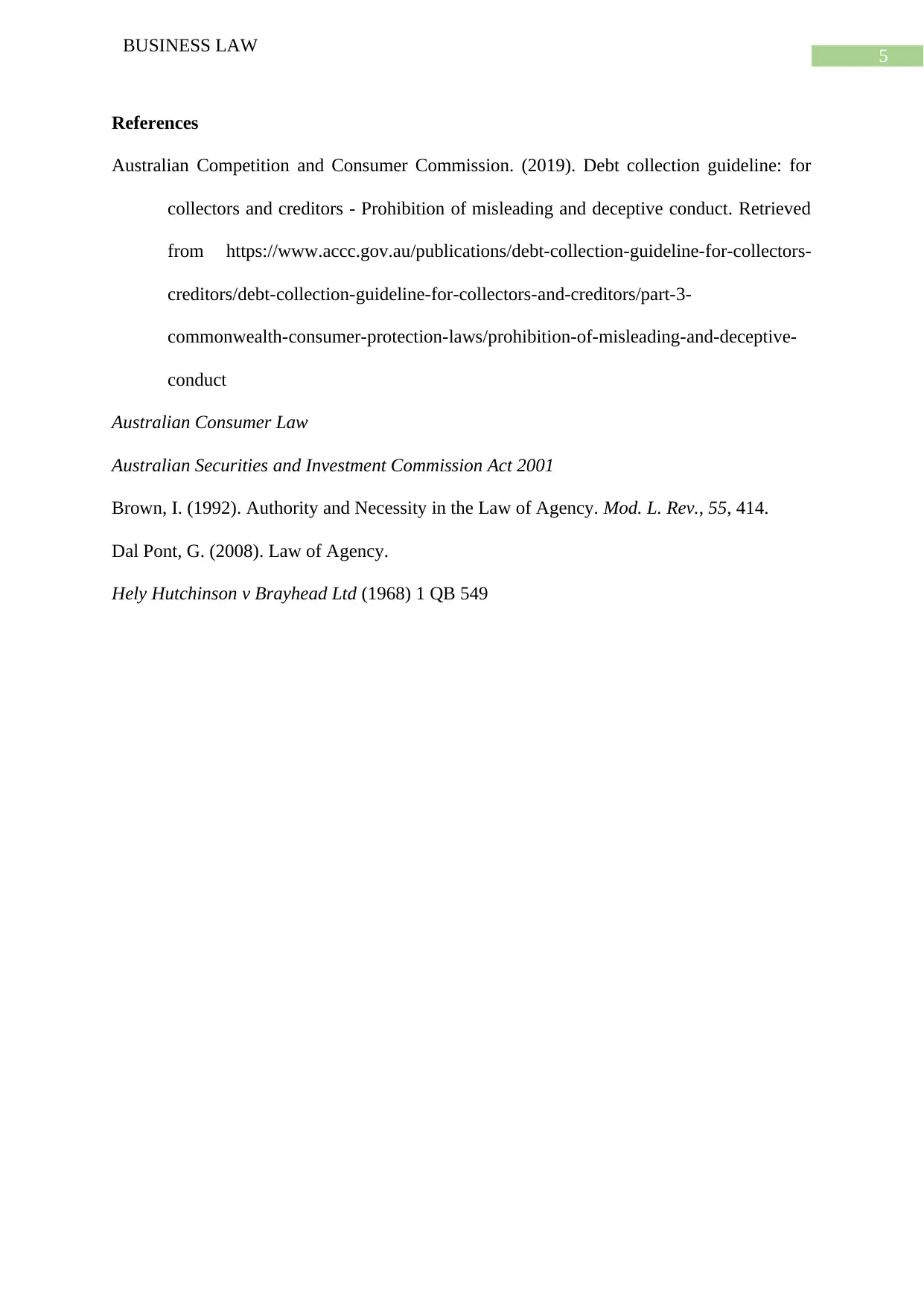
5
BUSINESS LAW
References
Australian Competition and Consumer Commission. (2019). Debt collection guideline: for
collectors and creditors - Prohibition of misleading and deceptive conduct. Retrieved
from https://www.accc.gov.au/publications/debt-collection-guideline-for-collectors-
creditors/debt-collection-guideline-for-collectors-and-creditors/part-3-
commonwealth-consumer-protection-laws/prohibition-of-misleading-and-deceptive-
conduct
Australian Consumer Law
Australian Securities and Investment Commission Act 2001
Brown, I. (1992). Authority and Necessity in the Law of Agency. Mod. L. Rev., 55, 414.
Dal Pont, G. (2008). Law of Agency.
Hely Hutchinson v Brayhead Ltd (1968) 1 QB 549
BUSINESS LAW
References
Australian Competition and Consumer Commission. (2019). Debt collection guideline: for
collectors and creditors - Prohibition of misleading and deceptive conduct. Retrieved
from https://www.accc.gov.au/publications/debt-collection-guideline-for-collectors-
creditors/debt-collection-guideline-for-collectors-and-creditors/part-3-
commonwealth-consumer-protection-laws/prohibition-of-misleading-and-deceptive-
conduct
Australian Consumer Law
Australian Securities and Investment Commission Act 2001
Brown, I. (1992). Authority and Necessity in the Law of Agency. Mod. L. Rev., 55, 414.
Dal Pont, G. (2008). Law of Agency.
Hely Hutchinson v Brayhead Ltd (1968) 1 QB 549
⊘ This is a preview!⊘
Do you want full access?
Subscribe today to unlock all pages.

Trusted by 1+ million students worldwide
1 out of 6
Related Documents
Your All-in-One AI-Powered Toolkit for Academic Success.
+13062052269
info@desklib.com
Available 24*7 on WhatsApp / Email
![[object Object]](/_next/static/media/star-bottom.7253800d.svg)
Unlock your academic potential
Copyright © 2020–2026 A2Z Services. All Rights Reserved. Developed and managed by ZUCOL.





